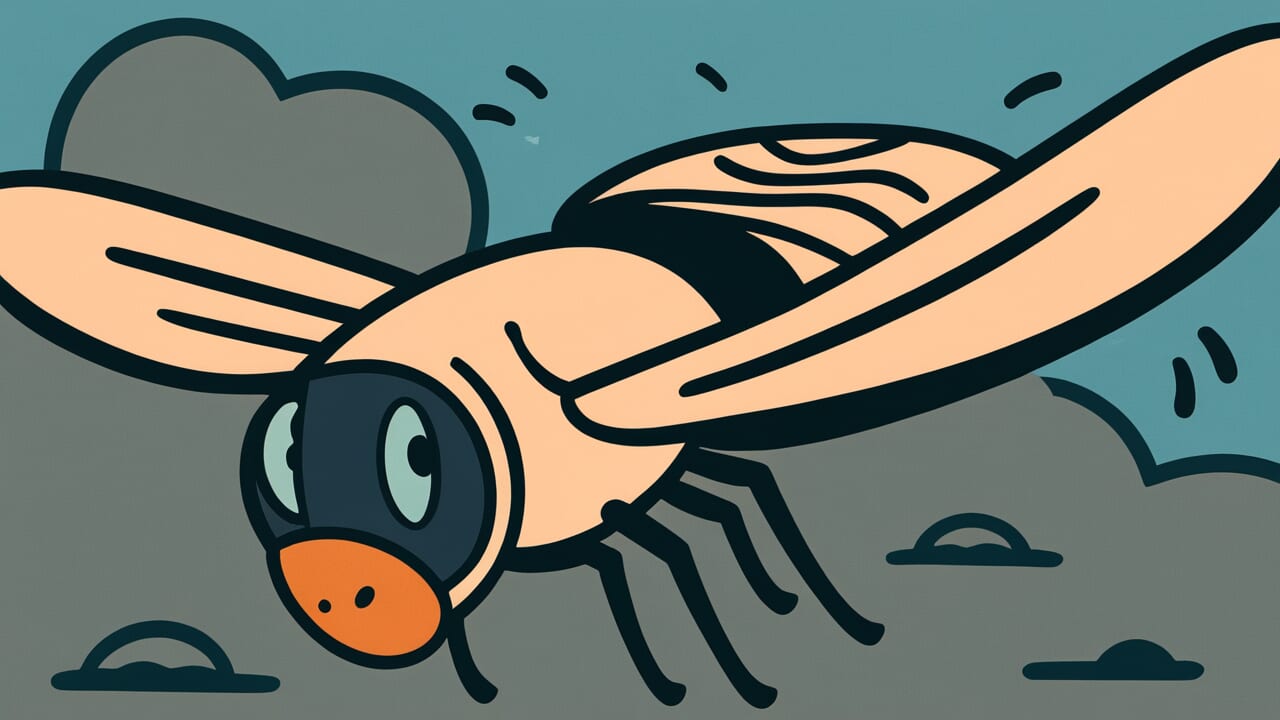How to Read “When flies fly, horseflies fly too”
Hae ga tobeba abu mo tobu
Meaning of “When flies fly, horseflies fly too”
“When flies fly, horseflies fly too” means that similar people imitate each other, or that people blindly follow others without thinking.
This proverb is mainly used in a critical context. It describes how people start doing the same thing without thinking deeply, just because someone else started it first.
The saying compares human behavior to flies and horseflies, two similar insects that fly around together. It highlights how people carelessly copy others’ actions.
People use this proverb when pointing out how others jump on trends or imitate successful people. It especially warns against copying others’ behavior without thinking for yourself.
Even today, this proverb fits situations like viral social media trends or business fads. It perfectly describes group psychology and conformity behavior.
Origin and Etymology
No clear written records explain the origin of this proverb. However, we can make interesting observations from how the words are structured.
Flies and horseflies have long been recognized as troublesome insects to humans. They look similar and fly in similar ways.
The proverb likely came from watching these two insects flying around together.
Why did people choose “flies and horseflies” instead of “butterflies and moths” or “sparrows and swallows”? The answer reveals something important.
Both flies and horseflies are unwelcome creatures. This choice shows the proverb always had a critical view of mindless imitation.
During the Edo period, common people watched others rush to copy whatever someone started. This behavior looked just like insects swarming together.
In business and fashion especially, countless people imitated successful individuals. This truly resembled insects gathering in swarms.
The word choice itself shows our ancestors’ sharp observation and ironic perspective.
Interesting Facts
Flies and horseflies look similar but have very different lifestyles. Flies gather around rotting things, while most horseflies drink flower nectar.
They look alike on the outside but differ on the inside. This deepens the proverb’s irony even further.
The combination perfectly represents people who copy only the surface without understanding the essence.
Japanese has many proverbs using insects. However, combining flies and horseflies is rare, showing this expression’s uniqueness.
Choosing two insects that both “fly” created a phrase with good rhythm.
Usage Examples
- When that shop became successful, a similar shop immediately opened next door. It’s truly “when flies fly, horseflies fly too.”
- Watching people jump on new investment opportunities, you realize how well the saying “when flies fly, horseflies fly too” captures it.
Universal Wisdom
“When flies fly, horseflies fly too” sharply captures extremely universal human traits: our imitation instinct and group psychology.
Humans are naturally social creatures. We survived by observing, learning from, and copying others’ behavior.
However, this survival strategy also carries the danger of stopping us from thinking. When someone succeeds, we want to copy their method.
When someone moves, we feel anxious that we must move too. This psychology never disappears, no matter how times change.
This proverb has been passed down because our ancestors knew from experience that this human trait sometimes leads to foolish results.
The anxiety about missing trends, the easy expectation that copying successful people will make us successful too, and above all, the comfort of abandoning independent thought.
These represent human weaknesses that haven’t changed from ancient to modern times.
At the same time, this proverb contains hope. By recognizing and naming these behavior patterns, we can view ourselves objectively.
Seeing ourselves in the flies and horseflies gives us a chance to stop and think. That might be the true power of proverbs.
When AI Hears This
The phenomenon where horseflies fly when flies fly is exactly what network science calls “preferential attachment.”
This principle states that “nodes that are already popular tend to gain even more new connections.”
It explains why social media followers and website links create skewed distributions where the rich get richer.
What’s interesting is that this phenomenon isn’t mere imitation but optimization of information processing costs.
For horseflies, fly behavior signals “there’s something valuable here” for free.
Referencing already-moving individuals is far more efficient than exploring all directions yourself. A chain reaction occurs as the result of rational judgment.
But here’s the trap. The Barabási-Albert model shows this mechanism exponentially amplifies small initial coincidences.
Just because the first fly happened to fly in the wrong direction, masses of horseflies rush to the wrong information source.
This creates an “information cascade.” In the 2008 financial crisis, some investors’ selling triggered a chain reaction.
Rational individual judgments accumulated into a systemically irrational crash.
The essence of this proverb shows a fundamental dilemma of networked society. Strategies smart at the individual level create vulnerability at the system level.
Lessons for Today
This proverb teaches you “the courage to pause before going with the flow.”
In our information-flooded modern society, everyone imitates something and follows something. That itself isn’t bad.
However, if you act without thinking about why you’re doing it or whether you really need it, you’ll lose sight of yourself.
What matters is learning from others’ success and actions while digesting them in your own context.
Even doing the same thing, you can only become yourself. Just as flies and horseflies are similar but different creatures, you and anyone else are different beings.
You can practice something starting today. When you’re about to start something new, ask yourself “Is this really what I want to do?”
That moment of questioning will make you the protagonist of your own life, not just an imitator.
Riding the flow differs from being swept away. Having eyes to distinguish that difference is this proverb’s gift.



Comments